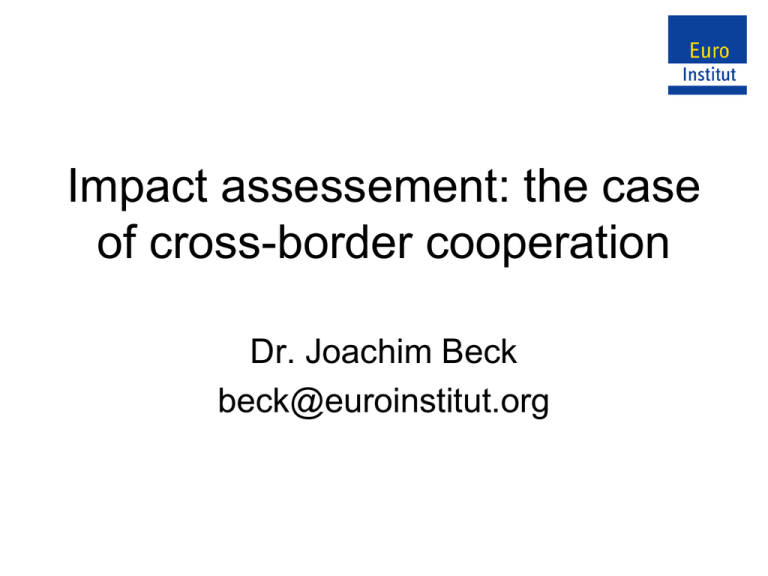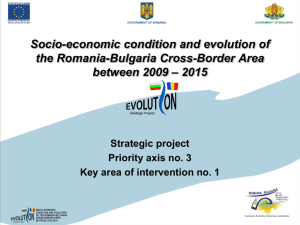Impact assessement: the case of cross-border cooperation Dr. Joachim Beck
advertisement

Impact assessement: the case of cross-border cooperation Dr. Joachim Beck beck@euroinstitut.org Regions in Europe Typology of cross-border territories (K.H. Lambertz) A. Dimension -Big (e.g. Balic Sea/Danube) -> „Macro“ -Middle (e.g. Upper-Rhine, Lake of Constance) -> „Meso“ -Small (e.g. Euregio/Eurodistrict) -> „Micro“ B. Complexity -Simple: two countries, one common language, one functional territory -Complex: Diverging systems, partners, cultures, languages… C. Nature of the border -Natural limit/boundary -Historically and politically sensible border D. The European perception -“old“ internal borders -“new“ internal borders since 2004 -External borders of the EU -No direct contact with EU -> Council of Europe/Neighbourhood-policy (e.g. black sea) Cross-border territories: the horizontal dimension of European integration • Border regions represent 40% of EU territory and 30% of the EU’s population • Cross-border territories represent key areas, where both the positive effects of European integration as well as the remaining obstacles to integration can best be studied • Cross-border territories are regions of potential and thus important catalysts for European Territorial Cohesion The border : a multidimensional phenomen… • • • • • • • • • Political borders Economic borders Legal borders Administrative borders Language borders Cultural borders Sociological borders Mental borders Natural borders … … that still creates a lot of territorial problems European support (INTERREG, EGTC,…) brought much progress Concrete projects instead of nice ideas… Real partnerships with shared co-financing instead of nice meetings… Integrated programmes instead of stand-alone approaches… Innovative structures instead of institutional sclerosis… CBC territories seen under a 360° perspective: From selective problem perception to a joint development of integrated potentials Key-challenges of CBC policy-making still unresolved • • • • • • • How to find the functional equivalence between different politico-administrative systems? How to base future action on a sound knowledge of the cross-border territory and its specific needs? How to act without substantial competences with New quality of most legal areas remaining with member states? CBC needs How to turn cultural and linguistic differences into systemic a productive interaction? capacity-building How to find the right level of institutionalization, how to integrate new actors from the non-public sector? How to define and measure the added-value of the integrated cross-border action? How to overcome a limited project-approach and develop sustainable policy approaches for the cross-border territory ? Two examples of how Impact assessment can help to improve CBC-policy making 1. The Impact assessment toolkit for CBC 2. Joint participation of CBC-territories in the Commissions IA work Optimizing project selection and using impact information at programme level Background to the Toolkit & Context EU 5th Cohesion Report EU Commission Impact Assessment System EU Sustainable Development Policy EU Territorial Co-operation Programmes (INTERREG & PEACE) Good Friday/Belfast Agreement Background to the Toolkit project & context EU Commission interest = territorial cohesion + visible results No back to back development Preventing funding fragmentation Using synergy effects Thematic concentration Evidence based territorial policy-making TOOLKIT FOR CROSS BORDER COOPERATION developing precise interventions to ensure maximum impact on the basis of regional knowledge with respect of specific regional characteristics and challenges, including local factors and attitudes Why do you need to do something and what are you going to do? (STEP 1; 2; 3) What do you want to CHANGE? Define Objectives: • General Objective(s) • Specific Objectives Baseline doublecheck! Identify Policy Approaches Choose the most effective and efficient cross border action for your project! A good Baseline helps you to quantify your Impacts! Especially ‘soft’ impacts can be made measurable if there are considered right from the beginning! What is the evidence for it? How do you want to measure it? (STEP 4; 5; 6) Designing a Monitoring and Evaluation Framework Who? When? Develop Appropriate Indicators Identify and choose Policy Actions: • Concrete Action 1 • Concrete Action 2 • Concrete Action 3 Identify Expected Impacts Think across all four pillars ! Preparing a good BASELINE/ SITUATION ANALYSIS – how can you give evidence for the problem? Identified & acknowledged Problems and Needs current state of discussion/art: - Operational Programmes - SWOT Analysis, - Macro analysis, - Studies, - Reports, - Evaluations - etc.... Look for: - Benchmarks - Good Practice examples Your own: SMART ASSESSMENT - inform your project - enable yourself to give evidence - closing information gaps e.g.: questionnaire, survey, ask for special statistic data, measure attitudinal change, etc. BASELINE proof & understand the entire Situation i.e. PROBLEM / NEED Stakeholder Consultation Get a feedback from Stakeholders! Mirror your project idea! GET OUT of the BLACK-BOX! Reality Check! Sensitivity Analysis Existing risk analysis © Euro-Institut Relevance of the Toolkit Method for the new INTERREG IVA Call The second perspective: Joint participation in the IA work of the EU Commission ? On the one hand… • CBC is limited to the European cohesion policy perspective (-> the INTERREG community). • The 5th cohesion report: A new policy approach with many good ideas but only few pages explicitly on CBC and still perception as disadvantaged regions ! • Hundreds of Directives, Regulations, Communications, Action Plans etc. at EU-level per year – 99% without consideration of possible impacts on cross-border territories ! • CBC territories not yet considered as real players at the EU-level (fragmentation of lobbying between MS, regions, CoR, EP and AEBR) • Main policy-competences and priorities remain with member states: but 70% of local and regional activities are directly impacted by EU law ! On the other hand… • CBC is more and more „in the air“: the „30/40“ argument is known in the Brussels institutions (30% of population/40% of the territory) • The value for money – argument becomes more important in the future: rethinking given CBC–approaches is necessary and welcome • The Commission has developed the EGCT, redesigns the cohesion policy and is more and more open for „the case of CBC“ • The concept of macro-regions (Baltic Sea, Danube, Mediteranean) refers explicitly to CBC • Intention to better coordinate EU sectoral policy-interventions at the territorial level • EU Commission is very open: need for territorial impact informations (especially on admin burden!) , transparency : roadmaps and consultations -> new opportunities for territorial actors ! The challenges from the CBC point of view • Different politico-administrative systems: regions with and without legislative power • Different approaches and structures of territorial interest representation in Brussels • Different capacities to carry out analytical work in an ex ante perspective • Lack of joint awareness for the cross-border territory • „Kill the bill“ approach (ex post is more efficient…) at national level… Good practice from the Upper-Rhine region • Participation in the consultation for the „Greenbook on territorial cohesion“ : one written statement based on a cross-border consultation of over 100 stakeholders from D / F / CH • Reform of the CMO of the wine sector: Joint interest representation of stakeholders from the upper-Rhine (D / F / CH) in Brussels • Participation of the District of Freiburg in the revision of the EU Waste-Management Directive: Assessment of possible territorial impacts -> informing the official statement of the Land Government for the EU-consultation • „Under construction“: a more systemic monitoring and participation on a multi-level basis (vertical and horizontal) Thank you ! Contact Dr. Joachim Beck Director Euro-Institut Rehfusplatz 11 D-77694 Kehl Tel. +49-7851-7407-27 Fax. +49-7851-7407-33 Mail: beck@euroinstitut.org www.euroinstitut.org




